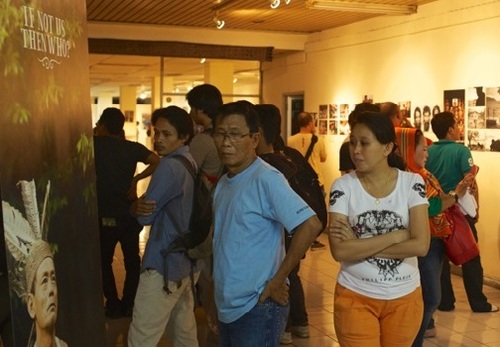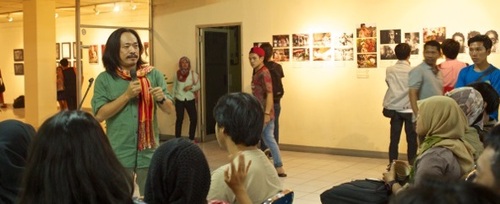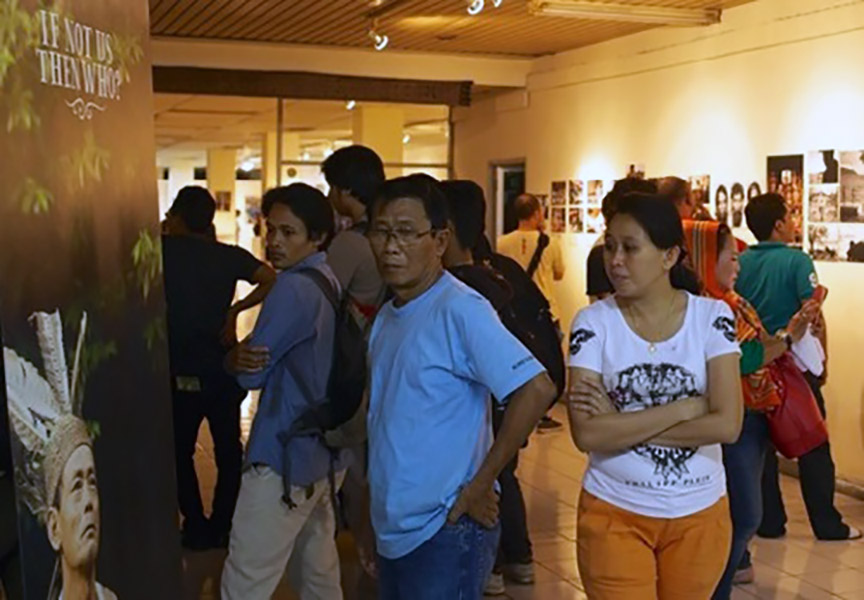“IF NOT THE INDIGENOUS PEOPLE OF THE ARCHIPELAGO THEN WHO?” AMAN ADDRESSING THE ROLE OF INDIGENOUS PEOPLE IN PROTECTING FOREST
Jakarta, 31 August 2014 – by Leoni Rahmawati
Indigenous Peoples Alliance of the Archipelago (AMAN) hosted Indigenous Peoples Week 2014 at Taman Ismail Marzuki, Cikini, Central Jakarta. Through the series of activities AMAN try to deliver information about the wealth of art, culture and traditions of indigenous people from different regions of the archipelago to wider public.

Storytelling
Indonesian Nature Film Society introduced the “If Not Us Then Who” project at this event by holding a film screening and discussion about the struggle of indigenous communities maintaining their forests. We showed two films, Mama Malin Su Hilang (Our Land Has Gone) and Sesepuh (The Elders).
‘Our Land Has Gone’, is a short documentary created and directed by Nanang Sujana in 2012. It tells the story of the Malind Anim tribe in the Zanegi village, Merauke, Papua, Indonesia. They are tribal hunters who rely on forests for their livelihood. The expansion of Medco Corporation nearby has meant thousands of hectares of forest have been cleared – these forest belonged to the tribe and it has had devastating consequences on the village. There are plans to convert 169,000 hectares of land to be used as industrial tree plantations through the MIFEE project (Merauke Integrated Food and Energy Estate). The film has been used to aid decision-making in the local area.
‘The Elders’, produced by AMAN, tells the story of several indigenous leaders in Indonesia who are struggling to defend their ancestral lands. It features Opung Nae Sinta Sibarani from Sugapa in Porsea, North Sumatra, Badri from Benakat in South Sumatra, Apai “Janggut” Bandi from Sungai Utik, Kapuas Hulu, West Kalimantan, Mama Aleta Baun from Mollo, East Nusa Tenggara and Datuk Ismail Zen from Sarolangun, They tell their story of the struggle against the development aggression that going on around the 80’s when the Suharto regime was still in power. Together they establish the movement of larger indigenous groups throughout the archipelago. With support from various NGOs, they formed the Indigenous Peoples Alliance of the Archipelago (AMAN) on March 17, 1999.
Role of indigenous people in maintaining the balance of the global climate
Abdon Nababan, Secretary General of AMAN, opened this event, highlighting the growing relationship between indigenous people and the government. However despite the progress, there are still barriers with the implementation of national policies at community level.
«There is a new hope from the Indigenous Peoples of the Archipelago for the newly elected president Joko Widodo (Jokowi) to include the agenda of the rights of indigenous people in his vision and mission”

Abdon invited world leaders who are concerned about the food and energy crisis to learn from the lives of indigenous people who take care of the forest. A strong statement that addresses a very basic question, who should play a role in addressing the global climate crisis? If it is not us, then who is going to care for our nature? By being closer nature, perhaps the answers to global problems can be found.
